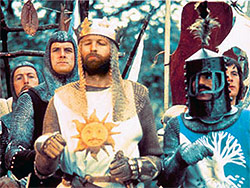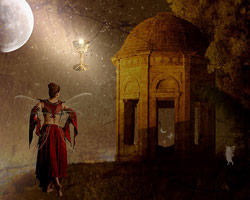Chapel Perilous
I’m writing a book. It’s almost done. Or so I tell people. Nobody but me can verify its existence, because I don’t seem to be able to share it with anyone. Yet. I’ve shown a few snippets of it to my husband, and to my best friend Seuss Dean with whom I can share almost anything, but in a way they are the most awkward audience for it because they both figure prominently in the narrative. So when people ask me what I’ve been working on, I just tell them that it’s a book about my experiences with psychedelics, flow arts, and polyamory. That’s usually enough to satisfy mere idle curiosity. If someone really presses me for information, I can sometimes be persuaded to divulge the working title: Playing With Fire – How I turned Chapel Perilous into the Flow Temple and Learned to Love God, the Devil, Myself, and Everyone Else.
 Predictably enough, this leads to people asking me to define Chapel Perilous for them. I’ve been trying to define it for myself, or rather to figure out what it means, for most of the five years that I’ve been working on the book. It’s a hard thing to put one’s finger on. In fact, that’s part of the point.
Predictably enough, this leads to people asking me to define Chapel Perilous for them. I’ve been trying to define it for myself, or rather to figure out what it means, for most of the five years that I’ve been working on the book. It’s a hard thing to put one’s finger on. In fact, that’s part of the point.
The history of the term is interesting. Traditionally, the Chapel Perilous or Grail Castle has been the ultimate destination for knights questing after the Holy Grail. For most people of my generation, this brings up an image out of Monty Python, as well it should. The story has been around for a long time, though. The mystical experiences within this chapel are the climax of many an Arthurian adventure story. Those who entered were typically subjected to a rigorous battery of challenges, some of which seem to be training exercises of sorts, while others are ultimate tests of purity, conviction, and understanding. Dangerous traps are to be found there, often tailored to force a confrontation with an individual knight’s personal weaknesses. Those who failed would not be allowed to access the Grail and might even be killed or driven mad in the attempt. On the other hand, a candidate who proved worthy might hope to be granted great power and priceless treasures.
The idea of Chapel Perilous as it is commonly used in psychedelic parlance comes from Robert Anton Wilson’s countercultural classic The Cosmic Trigger. Bob defines Chapel Perilous as: “A stage in the magickal quest in which your maps turned out to be totally inadequate for the territory and you’re completely lost.” He has quite a lot more to say on the topic, having spent a good deal of time there himself:
“Chapel Perilous, like the mysterious entity called ‘I,’ cannot be located in the space-time continuum; it is weightless, odorless, tasteless and undetectable by ordinary instruments. Indeed, like the Ego, it is even possible to deny that it is there. And yet, even more like the Ego, once you are inside it, there doesn’t seem to be any way to ever get out again, until you suddenly discover that it has been brought into existence by thought and does not exist outside thought. Everything you fear is waiting with slavering jaws in Chapel Perilous, but if you are armed with the wand of intuition, the cup of sympathy, the sword of reason and the pentacle of valor, you will find there (the legends say) the Medicine of Metals, the Elixir of Life, the Philosopher’s Stone, True Wisdom and Perfect Happiness.”
I myself tend to think of Chapel Perilous as the place where you find yourself when the sheer absurdity of it all can no longer be ignored. When it all starts to add up and multiply while remaining somehow stubbornly indivisible. When synchronicity spirals out of control and you finally discover that you really are, in fact, the center and purpose of the universe after all. Either that or you’re stone-cold crazy. Or maybe it’s both. It’s the dark night of the soul, and it’s generally understood to be some kind of a trap. But it’s also a doorway, if one has the courage, strength, intelligence, and luck to pass through it.
Not everybody visits the Chapel, of course. Even heavy psychedelic users often seem to navigate around it, or perhaps they slip through it quickly and easily, passing its tests and collecting its treasures without ever quite realizing that they’ve done so. Sometimes I envy those people; either so pure of heart that the door stands wide open for them or so solidly constructed that their ontologies don’t support that kind of nonsense in the first place. Thousands of frequent fliers do end up doing some hard time there at some point in their careers, though, as anybody who reads a lot of trip reports can attest.
I think it goes harder on people whose operating systems are susceptible to metaphysical speculation, for reasons that ought to be obvious enough. If you really know what you believe going in, it’s pretty hard for psychedelics (or anything else) to jerk you around. If someone has a strong clear spiritual faith, they tend to interpret whatever they find in terms of their pre-existing models. Conversely if a person is a dyed-in-the-wool rational atheist or a logical empiricist, they’re probably not going to come back from a big trip raving about contact with multi-dimensional entities or wormholes in the fabric of space-time. My friend Reilly is like that. He’s a professional scientist, and his hard-boiled positivism is utterly unassailable. He also happens to love DMT. I think maybe it’s easier and more fun for him than it is for me or any of my other friends, because although he experiences a wide spectrum of the classic effects, he’s pretty much immune to the pitfalls associated with taking any of it too seriously.
On the other hand, sometimes people get a big surprise that they were not at all expecting. I’ve seen folks who would surely have described themselves as ontologically secure and totally invulnerable to transcendental malarkey lose their proverbial shit in the wake of an unanticipated revelation brought on by their use of psychedelic drugs. And I’m not talking about brain damage cases here, unless your definition of damage extends to encompass unwanted software updates.
Spiritual experiences or their counterfeit counterparts (which may also be considered spiritual insofar as they have a direct bearing on the subject’s evolving spirituality) are so common amongst psychedelic aficionados that there is a large movement to rebrand certain substances as “entheogens”, which is Greek for something like “god-generating” or “divine within”. Psychonauts worldwide often report deeply spiritual, religious, or philosophically transformative trips. So much so that it’s kind of a psychedelic cliche. In fact, many users tend to look down their noses at anyone who takes drugs for reasons that are not overtly spiritual. So I think we can at least acknowledge the prevalence of the meme, whatever our personal opinions on the matter may be. It’s easy to imagine how an abrupt spiritual revelation, especially one that an individual is not culturally prepared to accept, can lead to the kind of cognitive dissonance that’s typically associated with the Chapel Perilous phenomenon.
Of course, some people who hold vigil in the Chapel don’t think about it like that. Many of the congregants there don’t consider themselves to be spiritual types at all. They simply think of themselves as rational atheists who just so happen to have been contacted by extraterrestrials. Or maybe they think they’re becoming a little bit telepathic around the edges, or precognitive, or they just keep seeing that same damn number everywhere they go. I’ve talked before about how synchronicity can pile up in the wake of a crisis or breakthrough, be it psychedelically inspired or otherwise. Synchronicity is like a rainbow in that it only exists relative to the viewpoint of a character who happens to be in the right position to manifest its effects. For sure our brains are pattern recognizing machines, and at least part of the explanation lies in our own shifting fields of focus and perception. Carl Jung, who coined the term, thought that in some cases it really did represent a statistical disruption of probability, though. And whatever you might think about the reflexive relationship between mind and matter, the subjective experience of a reality storm can be more than a little bit unsettling. When the fabric of the real seems to be unraveling, it’s easy to get paranoid or fixated, or to fly off into bouts of wild speculation. We can all think of a few fine minds who got way into psychedelics and then started raving about all kinds of whack-ass-sounding shit. Straight people often see this as a sign of brain-burn, but I tend to think of it as a stage in the Quest. Chapel Perilous can be a wilderness of mirrors in which fragments of our own souls are reflected back to us at odd angles, sometimes amplified and distorted beyond recognition.
The idea that the universe exists, at least in part, to somehow train us or test us, goes way back and runs real deep. I know lots of people who don’t consider themselves to be particularly religious or spiritually inclined who nevertheless seem to have a vague but pervasive sense of karmic propriety. If a person does something bad, they feel that their sins will surely come home to roost in one way or another. Perhaps this is just a superstitious method of dealing with hard feelings about an unfair world or wishful thinking on the part of long suffering do-gooders who want to imagine that they and others like them will one day be paid out for all their temporally unappreciated efforts. Likewise lots of people feel that they are being tested when trials arise in their lives, or that the universe is trying to teach them something. Mostly it’s pretty harmless. Amplified by psychedelics, though, this kind of thinking can turn your life into a cosmic comic book. The Faerie was raised on fantasy novels and Kung Fu flicks, so maybe I’m particularly susceptible to that sort of thing. But I’m not the only one who has wrestled with it. It’s fairly common to hear at least the plant psychedelics referred to as “teachers”. For me they were the Jedi masters that I’d been waiting for all my life. Unsurprisingly, a good deal of my training took place in Chapel Perilous. I had a kind of tenuous and ambiguous relationship with consensus reality there for a while. This was almost ten years ago now, but the memories of my confusion, conviction, and vulnerability still haunt me. I think that I might have lost the thread if hadn’t found a strong and sympathetic community to keep me anchored. I really, really, really, really do.
Any relationship that you can’t talk openly about strikes me as suspect. Yeah, yeah, the law and all that. Don’t risk your teaching position or your job as a cop. But if you can’t talk honestly about what’s going on with you to a friend or a counselor, or even to a stranger on the Internet for dog’s sake, you might be susceptible to unchecked squirrely notions. If you’re afraid that you’ll be judged as insane, or even if you’re afraid that you might pop your own bubble and lose faith in your own revelations and experiences, then it’s probably time to take a good hard look at your practice. In shamanic traditions, or even in non-psychedelic energetic practices like Kundalini Yoga, it is considered essential to train with somebody who knows what’s up. Otherwise a new student runs the whole gamut of risks associated with plugging themselves into voltage that they’re simply not rated for yet. Intuition is awesome. Intuition is great. Maybe, in the end, intuition and experience are indeed the best teachers. But there is a lot to be said for actual teachers. People have been at this for thousands upon thousands of years, and you don’t have to make stupid beginner’s mistakes or get caught in well-known perceptual traps if you’re willing to seek out and incorporate the wisdom of your elders. You don’t have to re-invent the wheel. There are wise people in the world who have been there and back again. Oh, you don’t know any of them? Go find one. Can’t find one? Read a book. Which book? Read reviews. Ask people. Ask people online. Read a bunch of different books and see what resonates. A book can’t give you much feedback, though. Find someone you can talk to. Sometimes just listening to yourself talk is all that it takes to see whatever you’ve got going on from a new perspective. Some of this stuff that gets buried in the human psyche tends to decompose in the presence of air and sunlight once you get it out in the open. Pay a homeless person $20 to listen to your story if you have to. If you really can’t find a listener, write up a trip report or a retrospective and read it out loud to yourself. Then send it to Erowid, so that others people can benefit from what you’ve learned (or at least see that they’re not alone).

The Zen master Shunryu Suzuki said that a premature enlightenment experience is not necessarily a good thing. I don’t know from enlightenment, but I know that at times, under the right circumstances, some of this stuff can rock people’s inner worlds. Psychedelics are deconditioning agents. Which is great. Culture is full of bullshit that we need to be deconditioned from. But revelation without integration can make you wish you’d taken the blue pill. Robert Anton Wilson said that people come out of Chapel Perilous either paranoid or agnostic, and there’s not really a third choice. I don’t believe that, though. I think it’s possible to recondition yourself to a broader and more ambiguous worldview, pass the tests, gain the powers, and carry the treasures back to renew your homeland. Of course, I wouldn’t know. I haven’t exactly made it out yet, myself. Maybe that’s why I can’t seem to finish my book.
Perhaps one day I will find the Holy Grail. Until then I plan to make myself
at home in Chapel Perilous. I like it here. It’s nice. I’ve written on the walls and rearranged the furniture. I’ve festooned the mirrored labyrinth with Silly String and marked the moving tiles with lipstick. I don’t expect the map to match the territory anymore. I’ve given up the need for closure. I can deal with a little bit of peril. I haven’t stopped playing with fire, but after having been burned a few times I’ve learned how to flow with it. I’ve got the wand of intuition, the cup of sympathy, the sword of reason, and the pentacle of valor. (Now if I could only remember where I put them.) And also, perhaps most importantly, I have the rubber chicken of humor. I’ve learned how to be crazy without going totally insane. I’ve learned how to lighten up. Erleichda! It’s a game, not a test or a trap. The Chapel is the Trickster’s temple, and the laws of storybook logic apply. Monty Python is probably as good a source for Grail mythos as Malory, though, from a practical standpoint. Don’t try to reason with silly people. Know when to run away. Watch out for the giant bunnies, and don’t take anything too seriously.
Image credit: Where is my temple? by Eddi 07 / CC BY-NC-ND 2.0


